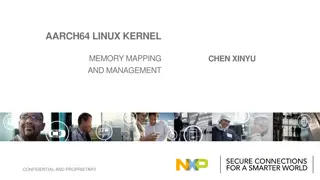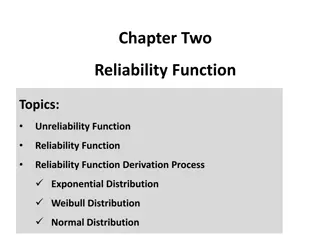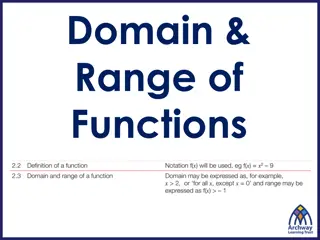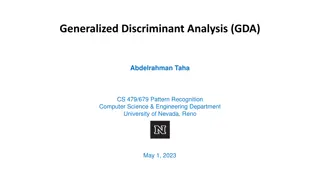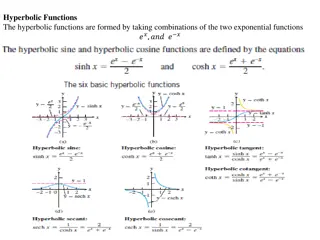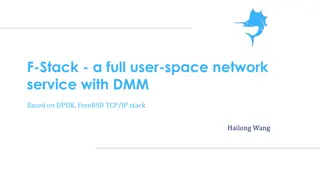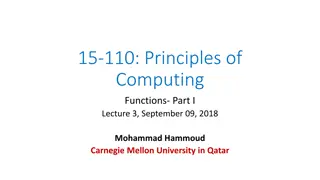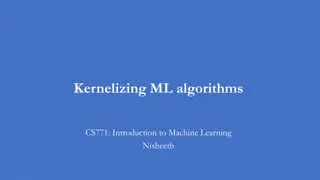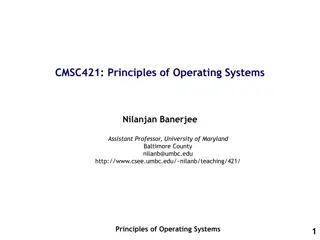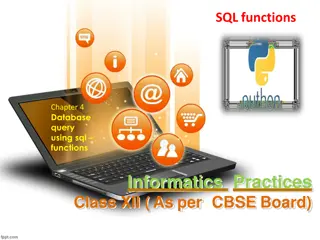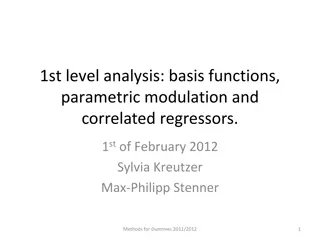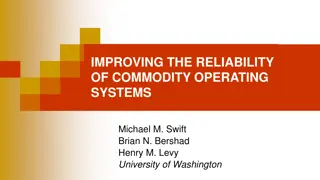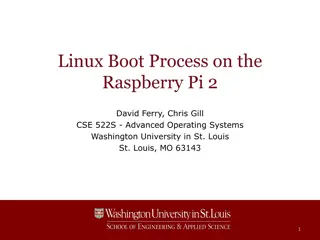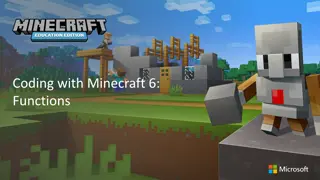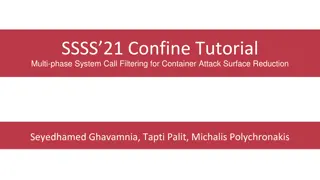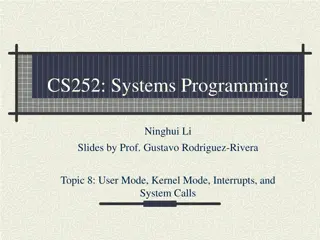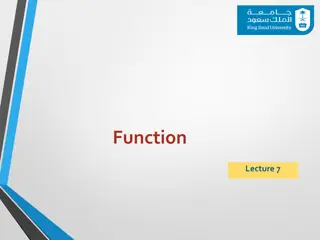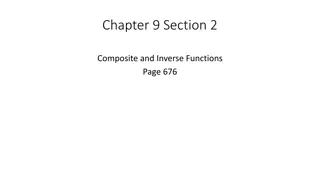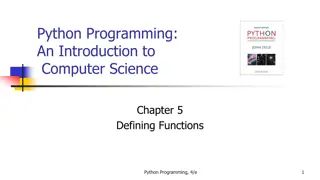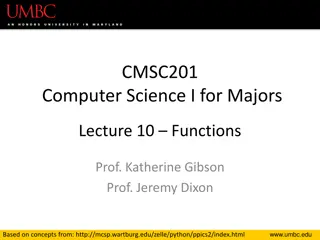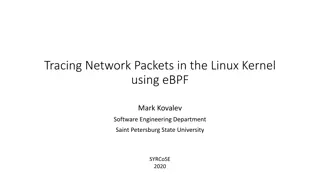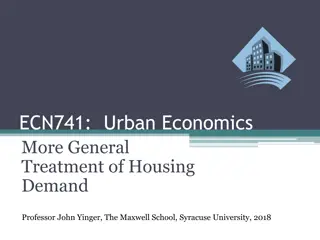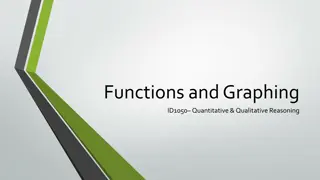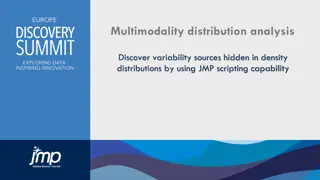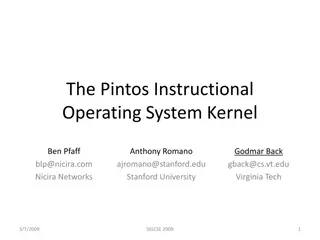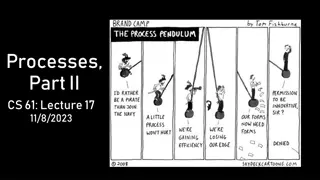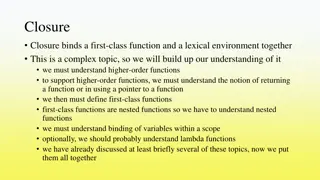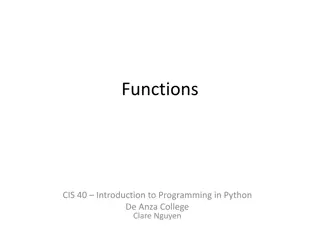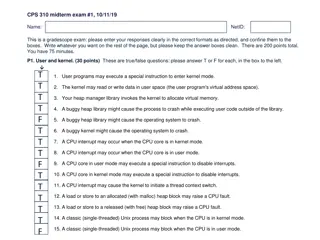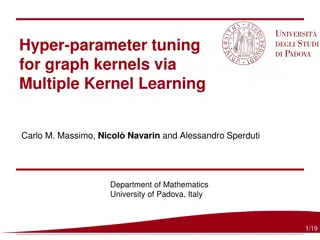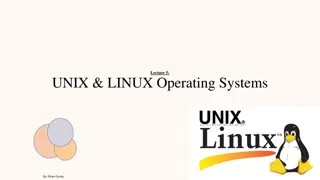Understanding Pointers and Functions in C++ Lecture
Exploring the concept of pointers and functions in C++, this lecture covers the basics of functions, passing arrays to functions, and understanding how pointers can be used in functions to manipulate data. Attendees will learn about passing entire arrays and returning multiple values using pointers.
10 views • 45 slides
Understanding AARCH64 Linux Kernel Memory Management
Explore the confidential and proprietary details of AARCH64 Linux kernel memory mapping, virtual memory layout, variable configurations, DDR memory layout, and memory allocation techniques. Get insights into the allocation of physically contiguous memory using Continuous Memory Allocator (CMA) integ
0 views • 18 slides
Understanding Reliability Functions in Data Analysis
Reliability functions play a crucial role in data analysis, providing insights into the probability of success or failure over time. This chapter delves into topics like unreliability functions, derivation processes for reliability functions using distributions like exponential, Weibull, and normal.
0 views • 19 slides
Livestock Marketing Functions and Classification
Livestock marketing involves various functions such as exchange, physical supply, facilitative functions like grading, transportation, storage, and more. These functions are classified into primary, secondary, and tertiary functions based on their roles. Assembling, processing, distribution, and equ
3 views • 23 slides
Understanding Functions: Graphs, Formulas, and Data Analysis
Explore the world of functions through tables, graphs, formulas, and real-world examples based on the book "Functions, Data, and Models" by S.P. Gordon and F.S. Gordon. Learn how to represent functions graphically, interpret data tables, and analyze relationships between variables. Dive into the app
1 views • 29 slides
Understanding Domain and Range of Functions
Understanding functions involves exploring concepts such as domain, range, and algebraic inputs. This content covers topics like constructing functions, common functions like quadratic and trigonometric, and solving functions based on given domain and range. It also provides practice questions to te
1 views • 21 slides
Understanding Generalized Discriminant Analysis (GDA) in Pattern Recognition
Generalized Discriminant Analysis (GDA) is a nonlinear form of Linear Discriminant Analysis (LDA) that utilizes kernel methods to find discriminatory features for optimal class separability. LDA aims to maximize the between-class covariance matrix while minimizing the within-class covariance matrix.
2 views • 17 slides
Understanding Hyperbolic Functions and Their Inverses
This content delves into the world of hyperbolic functions, discussing their formation from exponential functions, identities, derivatives, and inverse hyperbolic functions. The text explores crucial concepts such as hyperbolic trigonometric identities, derivatives of hyperbolic functions, and integ
0 views • 9 slides
Optimizing User-Space Network Services with F-Stack and FreeBSD TCP/IP Stack
F-Stack, a user-space network service using DPDK and FreeBSD TCP/IP stack, addresses challenges in handling service traffic like CDN and live streaming. By leveraging 25GbE, 40GbE, and 100GbE NICs, coupled with multi-core CPUs and kernel bypass techniques, F-Stack overcomes bottlenecks between user
1 views • 17 slides
Understanding Functions in Python: Basics and Usage
In this lecture on functions in Python, the focus is on the basics of defining and using functions. The session covers the formal definition of functions, parameters, local and global scopes of variables, return values, and pass-by-value concept. It emphasizes the importance of proper indentation in
1 views • 28 slides
Understanding Kernel Tricks in Machine Learning
Kernel tricks in machine learning involve transforming inputs into higher-dimensional spaces to make linear models work for nonlinear data. Kernels can be applied to various algorithms like SVM, ridge regression, and more, allowing for better model performance with complex datasets.
0 views • 15 slides
Understanding Functions: Tables, Graphs, and Formulas Based on Functions, Data, and Models
Explore the world of functions through tables, graphs, and formulas in this presentation based on the book "Functions, Data, and Models" by S.P. Gordon and F.S. Gordon. Learn how functions in the real world work, understand the relationship between variables, and see different representations of fun
0 views • 29 slides
Fundamentals of Operating Systems Explained
Explore the core concepts of operating systems, including kernel-userspace interactions, system calls, context switching, and virtual memory management. Delve into x86 assembly for system calls, hardware interrupts, and the flow of control during system call invocations. Gain insights into key compo
7 views • 19 slides
Understanding SQL Functions for Database Queries
SQL functions are essential elements in performing actions and obtaining results in a database query. They come in two main types: scalar functions and aggregate functions. Scalar functions operate on single values, while aggregate functions operate on sets of data. Examples of SQL functions include
0 views • 14 slides
Understanding Basis Functions and Hemodynamic Response Functions in fMRI Analysis
This content discusses the use of basis functions, parametric modulation, and correlated regressors in the first-level analysis of fMRI data processing. It delves into the concept of temporal basis functions for modeling complex functions of interest, such as the canonical hemodynamic response funct
1 views • 26 slides
Improving the Reliability of Commodity Operating Systems
This research paper discusses the challenges and solutions in enhancing the reliability of commodity operating systems by addressing system failures caused by kernel extensions. The Nooks approach isolates extensions within protection domains, allowing them to reside in the kernel address space with
0 views • 40 slides
Raspberry Pi 2 Boot Process Overview
Raspberry Pi 2's boot process involves a series of stages initiated by the GPU, loading essential firmware and enabling hardware components gradually, leading to the activation of the CPU and the kernel's entry point. The system transitions through various low-level processes before reaching a stabl
0 views • 9 slides
Understanding Functions in Coding with Minecraft
Functions in coding are self-contained sets of instructions that perform specific tasks within a computer program. They allow for code reuse and save time by writing instructions once as a function and calling it whenever needed. This content covers the purpose of functions, how they save time when
0 views • 30 slides
Multi-phase System Call Filtering for Container Security Enhancement
This tutorial discusses the importance of multi-phase system call filtering for reducing the attack surface of containers. It covers the benefits of containerization, OS virtualization, and the differences between OS and hardware virtualization. The tutorial emphasizes the need to reduce the kernel
0 views • 32 slides
Understanding User Mode, Kernel Mode, Interrupts, and System Calls in Computer Architecture
In modern computers following Von Newman Architecture, programs and data are stored in RAM. The CPU, RAM, ROM, and devices communicate via address and data buses. The system operates in both kernel and user modes, where kernel mode allows full system control, while user mode restricts access for sec
0 views • 29 slides
Understanding Composition of Functions in Mathematics
Learn how to perform operations with functions, find composite functions, and iterate functions using real numbers. Explore the composition of functions through examples and understand the domain of composite functions. Enhance your mathematical skills by mastering operations like addition, subtract
0 views • 10 slides
Understanding Functions in C Programming
Functions play a vital role in C programming by enabling the execution of specific tasks. They can be pre-defined or user-defined, offering flexibility and efficiency in code organization and execution. Pre-defined functions are already available in C libraries, while user-defined functions are cust
0 views • 46 slides
Understanding Composite and Inverse Functions
Learn about composite functions, inverse functions, and how to find their compositions and inverses through examples and step-by-step explanations. Explore the concept of forming composite functions, verifying inverse functions, and finding the inverse of a function using interchange and solving met
0 views • 15 slides
Introduction to Defining Functions in Python Programming
This chapter introduces the concept of defining functions in Python programming. It covers the importance of dividing programs into sets of cooperating functions, defining new functions in Python, understanding function calls and parameter passing, and reducing code duplication through the use of fu
0 views • 78 slides
Understanding Functions in Computer Science I for Majors Lecture 10
Expanding on the importance of functions in programming, this lecture delves into dividing code into smaller, specific pieces, defining functions in Python, understanding function calls and parameter passing, and using functions to enhance code modularity. Key topics covered include control structur
0 views • 62 slides
Tracing Network Packets in Linux Kernel with eBPF
This presentation discusses the challenges of troubleshooting modern networking systems and proposes a solution using eBPF technology to trace the path of network packets in the Linux kernel. The goal is to develop a tool that provides detailed information about how network packets are processed in
0 views • 16 slides
Understanding Housing Demand Theory in Urban Economics
Explore the nuances of housing demand theory in urban economics, covering topics such as alternative utility functions, exponential density functions, maximizing bid functions, and comparative statics. Delve into Stone-Geary and CES utility functions, their implications on demand functions, and the
0 views • 35 slides
Understanding Functions and Graphing in Mathematics
Functions and graphing play a crucial role in quantitative and qualitative reasoning. We explore the concept of points on a graph, coordinates, relations, functions, and ways to express functions. Utilizing visual aids and analogies, we delve into the importance of coordinates, the distinction betwe
0 views • 10 slides
Understanding Computer Architecture: Exploring MIPs, Assembly Code, and BIOS Functions
Dive into the world of computer architecture with a focus on MIPs assembly language, basic program formats, BIOS functions, and system calls. Learn about the role of the OS kernel, memory addresses, and control flow in executing programs efficiently.
0 views • 16 slides
Analyzing Multimodality in Density Distributions Using JMP Scripting
Explore variability sources hidden in density distributions through JMP scripting. The analysis focuses on identifying and filtering distribution modes in semiconductor fab electrical measurements using kernel estimation and empirical rules. Antonio D'Angelo and Felice Russo from Lfoundry S.r.l. Ita
0 views • 6 slides
Understanding Remote Procedure Call (RPC) in Different Kernel Environments
Communication through Remote Procedure Call (RPC) plays a crucial role in facilitating seamless interaction between server and client processes, whether on the same machine or across different kernels. This technology streamlines local and cross-domain communication, optimizing performance while ens
0 views • 9 slides
Overview of the Pintos Instructional Operating System Kernel Project
Description of the Pintos Operating System Kernel project, including its use in educational settings at institutions such as Stanford University and Virginia Tech. The project aims to provide students with a hands-on experience in OS design, focusing on the internal workings of the kernel. Pintos fe
0 views • 33 slides
Understanding Pipes in Process Communication
Pipes in process communication allow for high-throughput data transfer between parent and child processes. The kernel creates a communication stream through file descriptors, enabling one process to send data to another. Processes can use pipes for efficient inter-process communication, with the ker
1 views • 15 slides
Understanding Closures, Lambda Functions, and Higher-Order Functions in Programming
In programming, closures bind functions and lexical environments, while lambda functions are nameless and used by higher-order functions. Higher-order functions operate by applying other functions, such as map and fold functions. Example implementations in LISP demonstrate how these concepts are uti
1 views • 16 slides
Introduction to Python Functions: Overview and Usage
In this module, we delve into Python functions, exploring common built-in functions and how to create custom functions. We learn the properties of functions, how to coordinate multiple functions, and concepts of modularization. Discover the essence of functions in Python programming through practica
0 views • 17 slides
Understanding User and Kernel Modes in Operating Systems
The content provided discusses various aspects of user and kernel modes in operating systems through a set of true/false questions related to user programs, CPU interrupts, heap management, and process behavior in different modes. It touches on the role of the kernel in managing virtual memory, hand
0 views • 10 slides
Hyper-Parameter Tuning for Graph Kernels via Multiple Kernel Learning
This research focuses on hyper-parameter tuning for graph kernels using Multiple Kernel Learning, emphasizing the importance of kernel methods in learning on structured data like graphs. It explores techniques applicable to various domains and discusses different graph kernels and their sub-structur
0 views • 20 slides
Overview of UNIX and Linux Operating Systems
The UNIX brand encompasses a range of powerful multitasking, multiuser operating systems used by various organizations to develop IT technologies. UNIX internals consist of kernel space and user space, with programs accessing system services rather than hardware directly. The Unix filesystem is a ke
0 views • 36 slides
Understanding Functions in C Programming
Functions play a crucial role in C programming, allowing for modularity and reusability of code. This content covers the basics of functions, creating custom functions, passing arguments, returning values, and the anatomy of a C function. Learn about defining functions, passing arguments effectively
0 views • 24 slides
Understanding Context Switching and User-Kernel Interaction in Operating Systems
Context switching in operating systems involves a seamless transition between user-level threads without the kernel's awareness. User-level code manages register state and stack pointers, while user-kernel mode switching requires changing processor privilege levels and agreement on information excha
0 views • 25 slides

